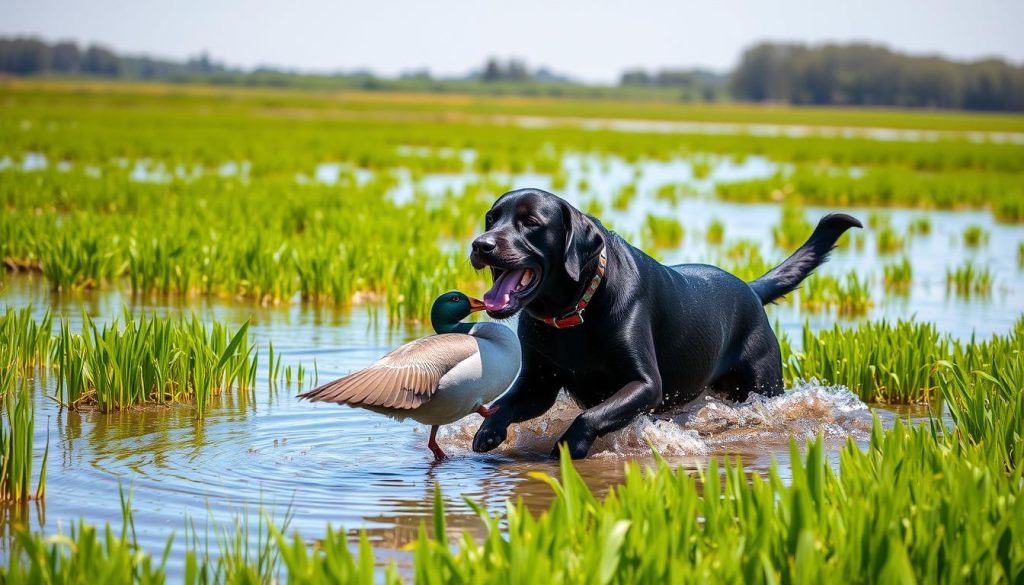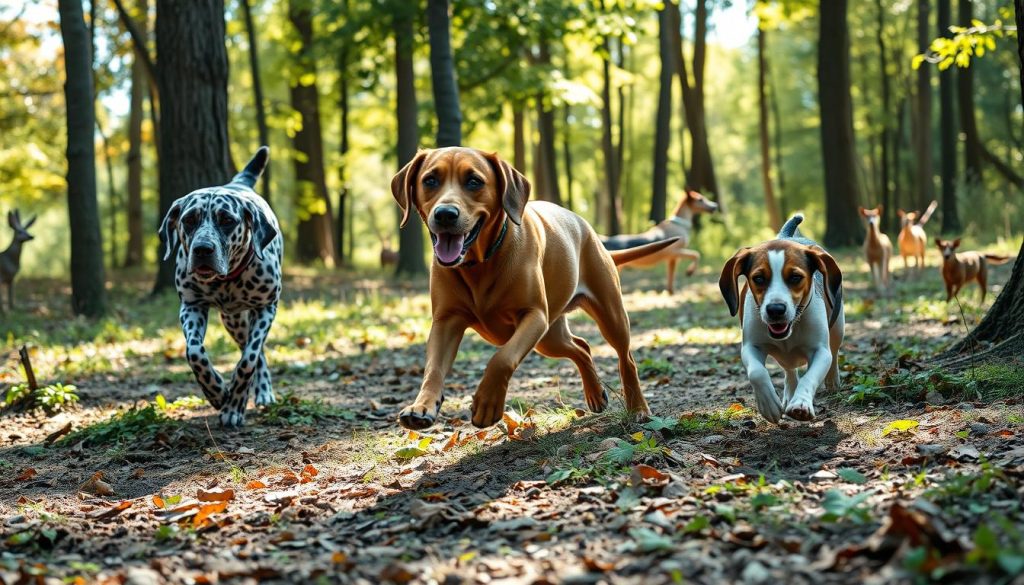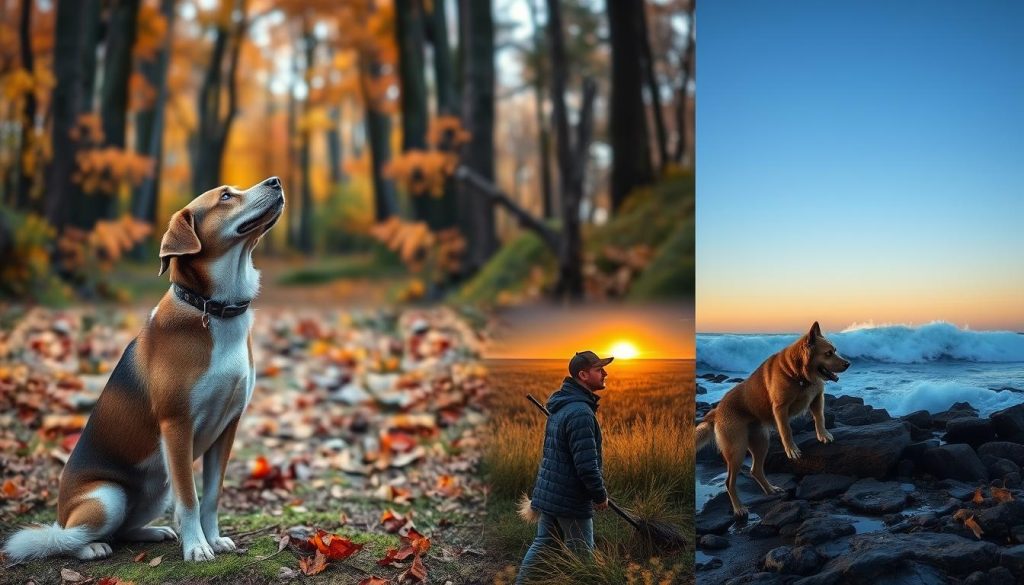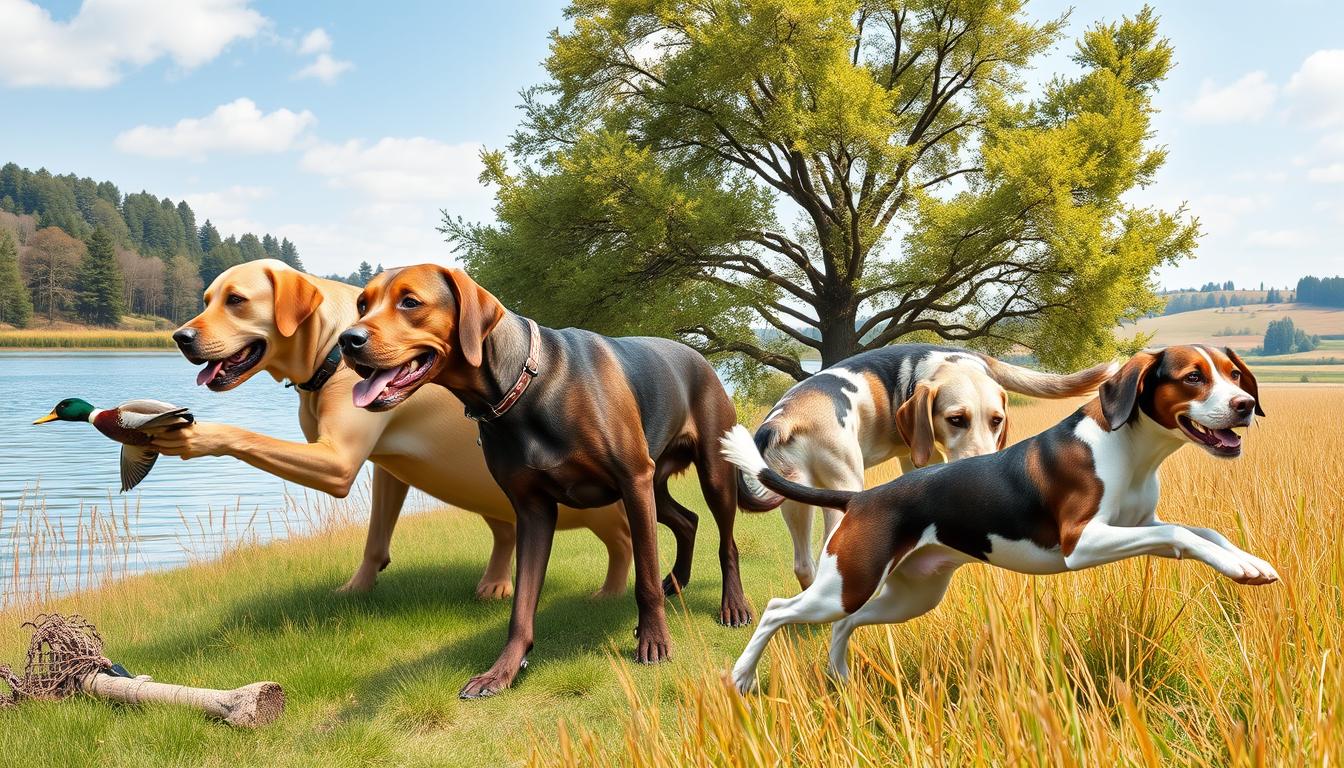Having a skilled hunting dog breed by your side can change everything. These dogs, known as sporting dogs or gun dogs, are bred to help hunters. They have special qualities that make them great hunting partners, improving your hunt’s success and fun.
There are many top hunting dog breeds in the U.S., like the Labrador Retriever and German Shorthaired Pointer. These dogs are not just good at hunting. They are also loyal, smart, and easy to train, making them great companions.
In this article, we’ll look at the best hunting dog breeds and what makes them special. Whether you’re an experienced hunter or new to it, knowing about these breeds will help you pick the right one for your next adventure.
What Makes a Great Hunting Dog Breed?
Choosing the right hunting dog is key. Temperament, trainability, physical traits, energy, and stamina are crucial. These factors help a dog excel in hunting.
Temperament and Trainability
A top hunting dog has a calm and focused temperament. They must be eager to please and quick to learn. This makes them easy to train.
Breeds that love to work and follow commands do well in hunting. They form strong bonds with their handlers.
Physical Attributes That Matter
Physical traits vary by the game hunted. But, a strong build, keen sense of smell, and weather-resistant coat are essential. Medium to large breeds often have the strength needed for long hunts.
Energy Levels and Stamina
Hunting dogs need lots of energy and stamina all day. Breeds that are naturally energetic and can cover a lot of ground are best. Regular exercise keeps them ready for action.
By looking at these key traits, hunters can find a breed that’s perfect for hunting. This ensures a strong partnership in the field.
Popular Hunting Dog Breeds in the United States
In the United States, some dog breeds are more popular for hunting. They are known for their skills, temperament, and how well they adapt to different hunting situations. Let’s explore three of the most loved hunting dog breeds in the country.

Labrador Retriever
Labrador Retrievers are highly versatile and loved by many hunters. They are smart and friendly, making them great at retrieving waterfowl. Their excellent nose helps them track and retrieve game well.
They also have strong swimming skills and a water-resistant coat. This makes them perfect for hunting in wet areas.
German Shorthaired Pointer
German Shorthaired Pointers are a favorite among hunters, especially those who hunt upland game birds. These dogs are athletic and full of energy. They have a strong sense of smell, which they use to find and point at game.
They are also good at retrieving, making them a great choice for hunters. They can handle many tasks in the field.
Beagle
Beagles may be smaller than Retrievers and Pointers, but they are highly valued for their scent-tracking skills. They are often used to hunt rabbits and hares. They can follow a scent trail for miles.
Beagles are also known for their cheerful and friendly nature. They make great hunting companions and family pets.
Versatile Hunting Dogs for Different Game
Having a versatile dog breed by your side can change the game. Different types of game need specific skills from your dog. Let’s look at some popular breeds that excel in various hunting scenarios.

Waterfowl Hunters’ Best Friends
For waterfowl hunters, breeds like Labrador Retrievers, Chesapeake Bay Retrievers, and American Water Spaniels are top choices. These dogs have webbed feet and water-resistant coats. They also have a strong desire to retrieve, making them perfect for hunting ducks and geese in wetland environments.
Pointers for Upland Game Birds
When it comes to upland game bird hunting, pointers like the English Setter, German Shorthaired Pointer, and Brittany are highly regarded. These bird dogs have an incredible sense of smell. They can locate and point at game birds such as quail, pheasants, and grouse. Their athleticism and stamina enable them to cover vast stretches of land tirelessly.
Big Game Tracking Specialists
For those who enjoy hunting big game, hounds like the Bluetick Coonhound, Plott Hound, and Black and Tan Coonhound are excellent choices. These breeds have a keen sense of smell and the tenacity to track large animals such as deer, elk, and even bears over long distances. Their baying alerts hunters to the location of the game, making them invaluable partners in the field.
Characteristics of a Reliable Hunting Companion
Choosing a hunting dog requires looking at key traits. A strong bond between the hunter and dog is vital for success. Hunting breeds are known for their loyalty and dedication.

Loyalty and Bonding
A good hunting dog forms a deep bond with their owner. Breeds like Labrador Retrievers, German Shorthaired Pointers, and Beagles are very affectionate. They want to please their owners.
This loyalty means they work hard and stay focused. It’s important for a successful hunt.
Ability to Handle Various Environments
A reliable hunting companion must adapt to different places and weather. Whether in forests, fields, or wetlands, your dog should be comfortable. Dogs with thick coats, like Chesapeake Bay Retrievers, handle cold, wet conditions well.
Dogs with shorter coats, like Vizslas, do great in warmer places. Stamina and endurance are key for hunting in various environments. Breeds like English Setters and Brittanys have lots of energy and can cover a lot of ground.
Grooming and Maintenance Needs
Keeping your hunting dog in top shape is key. Regular grooming and maintenance are crucial. Different coat types need specific care to keep their coat healthy and free from debris.
Coat Types and Care
Short-coated breeds like Labradors or Beagles need less grooming. Longer-coated breeds, like German Shorthaired Pointers, need more. Brushing regularly helps keep their coat shiny and healthy. Pay extra attention to areas that easily mat, like behind the ears or under the legs.
Essential Health Checks
Regular vet visits are vital for your dog’s health. Make sure they’re up-to-date on vaccinations and preventatives for fleas, ticks, and heartworms. Check their ears, eyes, and teeth for infections or diseases. Trimming their nails helps prevent discomfort and improves traction.
Feeding Considerations
Good nutrition is essential for your dog’s performance and health. Choose a high-quality dog food that supports their active lifestyle. Consider their age, weight, and activity level when deciding on food portions. Always provide fresh, clean water, especially during hunting.
By focusing on grooming, health checks, and nutrition, your dog will stay in top condition. They’ll be ready for any adventure with you.
Training Techniques for Hunting Breeds
Preparing your hunting dog for the field requires the right training techniques. A well-trained dog makes hunting more enjoyable and keeps everyone safe. We’ll look at key training aspects for hunting breeds.
Basic Obedience Training
Basic obedience training is essential before learning hunting skills. Teach your dog commands like “sit,” “stay,” “come,” and “heel.” This helps you control and focus your dog during hunts. Use consistency and positive reinforcement for obedience training.
Specialized Hunting Training
After basic training, introduce specialized hunting skills. Your dog will need to learn specific skills for different game types. For example, retrieving waterfowl, pointing and flushing upland birds, or tracking big game.
Working with a professional trainer is helpful. They can teach your dog these skills effectively.
Socialization Tips
Socialization is crucial for hunting breeds. Expose your dog to people, animals, and environments early. This helps them adjust and be confident in various situations.
Socialization prevents fear and aggression. It makes your dog a reliable hunting partner.
My Personal Experience with Hunting Dog Breeds
Over the years, I’ve hunted with many dog breeds. Each one brought their own skills and personality to the field. These experiences have made my hunting trips richer and deepened my respect for the bond between a hunter and their dog.
Memorable Hunting Trips
One trip that stands out was with my Labrador Retriever, Max. His amazing sense of smell and never-give-up attitude helped us catch a lot of waterfowl. Seeing Max bring back each bird, his tail wagging, filled me with pride and gratitude for our partnership.
Another adventure was with my German Shorthaired Pointer, Luna, on an upland game bird hunt. Her natural pointing and endless energy made the day thrilling. We moved through tall grass and dense brush, Luna showing me where to find hidden pheasants and quail.
The Bond Between Hunter and Dog
The bond between a hunter and their dog is truly special. It’s based on trust, communication, and shared experiences. Through training and hunting together, a strong connection forms that goes beyond a working partnership.
I’ve seen the loyalty and devotion these dogs have for their hunters. They’re not just tools for hunting; they’re cherished companions who share in the hunt’s joys and challenges. The respect and understanding between hunter and dog make the hunting experience better for both.
Preparing for a Hunting Trip with Your Dog
As a dedicated hunter, I know that preparing for a hunting trip with your dog is crucial. It’s important to gather essential gear, prioritize safety, and plan for post-hunt care. This ensures a successful and enjoyable experience for both you and your faithful companion.
Essential Gear and Supplies
When preparing for a hunting trip, make sure to pack the following essential gear for your dog:
- Sturdy collar with identification tags
- Leash and harness
- Water and food bowls
- High-quality dog food and treats
- First-aid kit tailored for dogs
- Protective vest or jacket (depending on the terrain and weather)
- Dog boots to protect paws from rough terrain
Safety Precautions to Consider
Prioritizing your dog’s safety during the hunt is essential. Consider the following precautions:
- Ensure your dog is wearing a bright, visible collar or vest to avoid accidental shots.
- Check the weather forecast and prepare for extreme conditions.
- Familiarize your dog with the hunting area and establish clear boundaries.
- Keep your dog hydrated and well-fed throughout the hunt.
- Watch for signs of exhaustion or injury, and take breaks as needed.
Post-Hunt Care for Your Dog
After the hunt, it’s important to give your dog the proper care and attention. Here are some post-hunt care tips:
- Check for any injuries or ticks and address them immediately.
- Clean and dry your dog’s coat thoroughly, especially if they’ve been in water.
- Provide a warm, comfortable place for your dog to rest and recover.
- Offer plenty of fresh water and a nutritious meal.
- Reward your dog with praise and treats for a job well done.
By properly preparing for your hunting trip, prioritizing safety, and providing post-hunt care, you and your loyal hunting dog will be ready for many memorable adventures together.
Conclusion: Choosing the Right Hunting Dog Breed
Choosing the right hunting dog breed is key to great hunting adventures. You must think about your lifestyle and hunting plans. Look at the dog’s energy, trainability, and physical needs to match your own.
Assessing Your Lifestyle
Be honest about your lifestyle when picking a hunting dog. Some dogs need lots of exercise and mental play. If you’re busy or have little space, choose a breed that fits your life well.
Finding the Perfect Match for Your Adventures
After thinking about your lifestyle, find the right dog for your hunting. Look into different breeds and talk to hunters or breeders. They can help you find a breed that’s great for your hunting style.
Choosing the right hunting dog is a big decision. It needs careful thought and planning. Find a dog that’s skilled and fits your life perfectly. With the right dog, you’ll make lasting memories in the outdoors.

